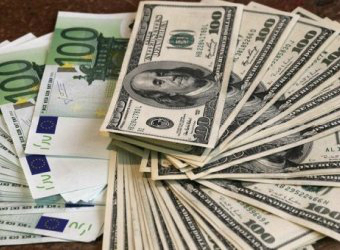A slide in U.S. bond yields pressured the dollar against the yen on Monday, while the euro struggled for traction after suffering significant losses at the end of last week on renewed concerns about the next French elections.
Markets, already nervous over the possibility of a win for far-right, anti-European Union candidate Marine Le Pen, were jolted after two French hard-left candidates late on Friday said they were discussing cooperation in their bid for the country’s presidency.
The fear in markets is that a unified left-wing front cause the centrist vote to shift towards Le Pen.
The latest spike in European political risks nudged down the dollar against the yen by pushing down Treasury yields to one-week lows of 2.4 percent.
The dollar was little changed at 113.090 yen, not far from 112.620, its lowest since February 9 touched on Friday.
The dollar index against a basket of currencies was steady at 100.930. The index had risen for 10 straight days earlier this month before losing momentum despite a string of solid U.S. data, to the frustration of dollar bulls.
“It is hard for dollar/yen to move higher when the 10-year Treasury yield, which initially rose to as high as 2.6 percent, is not stuck around 2.4 percent,” said Koji Fukaya, president of FPG Securities in Tokyo.
The Treasury 10-year yield rose above 2.6 percent in December to a two-year high when expectations were at their peak that U.S. President Donald Trump would embark on large financial stimulus and reflationary policies once he became president.
“There is also the possibility of the next U.S. rate hike being pushed back to May instead of March. The Fed might not be inclined to hike rates, and thus induce a rise in yields, just on the Trump administration’s deregulation moves and tax cuts,” Fukaya said.
Hopes of developments in fiscal stimulus schemes under Trump have not materialized yet, cancelling out some of the recent dollar-supportive factors.
A combative presidential news conference on Thursday raised doubts over how effective Trump’s administration will be in pushing through its economic agenda.
The euro crawled up 0.1 percent to 1.0613 after dropping 0.6 percent on Friday.
The common currency nudged up 0.2 percent to 120.010 yen after plumbing an 11-day low of 119.650. It had slid nearly 1 percent on Friday against the yen.
“The latest round of risk aversion that supported the yen is likely to be a sporadic one, as equities are still well supported globally. It is not the typical ‘risk off’ that engulfs the broader financial markets and leads to the safe-haven buying of the yen,” said Masafumi Yamamoto, chief forex strategist at Mizuho Securities.
Elsewhere, the pound was flat at $1.2414 after dropping 0.7 percent on Friday, after a surprise third monthly fall in British retail sales pointed to weakening consumer sentiment.
The Australian dollar dipped 0.1 percent to $0.7670 but still in touch of a 3-1/2 month high of $0.7732 scaled last week.
The Aussie has enjoyed steady support this year from a surge in the price of iron ore, the country’s chief export. But uncertainty regarding the country’s monetary policy and economic performance has prevented the currency from making further gains.
The New Zealand dollar was down 0.1 percent at $0.7177. Focus was on Wednesday’s global dairy price auction.
The kiwi is often impacted by the price of milk, New Zealand’s top export product.
Source: Reuters


